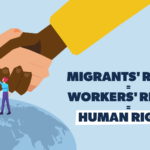
International Day of Care and Support: Care workers deserve care too
Canada’s unions are marking the first International Day of Care with a call for greater investment in improved wages and working conditions for care workers.
We all need care at some point in our lives. Our jobs, our families and our economy depend on having our care needs met. In Canada, nearly 1 in 5 workers are employed in paid care work occupations, which is an estimated 3 million people.
“For too long, political leaders and Canadian society have taken both paid and unpaid care work for granted. As a result, much of this work—largely performed by
women—remains precarious and undervalued, while those who perform it are perennially at risk of violence and harassment,” said Bea Bruske, President of the Canadian Labour Congress. “Care workers in this country deserve better. It’s time that we take care of our care workers.”
Care work includes health care and mental health; early childhood education and child care; care for the elderly and people with disabilities; domestic work; and other vital social and health care services that support our families and communities. Many of these workers are Black, racialized, immigrant and migrant women and women with disabilities.
The quality, availability and accessibility of care work and care services are central to the struggle for decent work. Without a vision and movement for inclusive, equitable, and high-quality care, the growing demand for caring labour threatens to reinforce the gender, race and class inequities that shape both care provision and access to care.
“The gendered impacts of the care crisis are real, with deep impacts on the women who work in care. These women are working in precarious jobs, for low wages and in poor working conditions. This is a longstanding, unfair and unsustainable situation,” said Siobhán Vipond, Executive Vice-President of the CLC. “Between the health impacts associated with ongoing climate events and an aging population in Canada, things are likely to worsen if this isn’t addressed now.”
Canada needs a forward-thinking, integrated care strategy, guided by the International Labour Organization’s (ILO) framework. The ILO framework recommends approaches and policy measures that:
- Recognize that care is essential and that access to care is a human right;
- Reduce the unfair and unequal burden of unpaid care responsibilities borne by women and families and redistribute the responsibility for providing care more equitably by ensuring that quality, public care services are available for everyone;
- Reward care work appropriately by improving wages and working conditions for workers in all care sectors; and
- Ensure care workers’ representation in the decisions that impact them, including by promoting the right to organize and bargain collectively.
“We must continue to build on and amplify initiatives to address the pressing workforce, access, and affordability issues in specific sectors, including health care and child care,” said Bruske. “Canada needs a comprehensive and integrated approach to support care workers and strengthen Canada’s care economy across all sectors. Canada’s unions are committed to supporting our valuable care workers across the country.”







